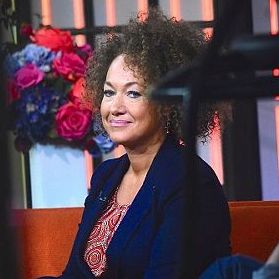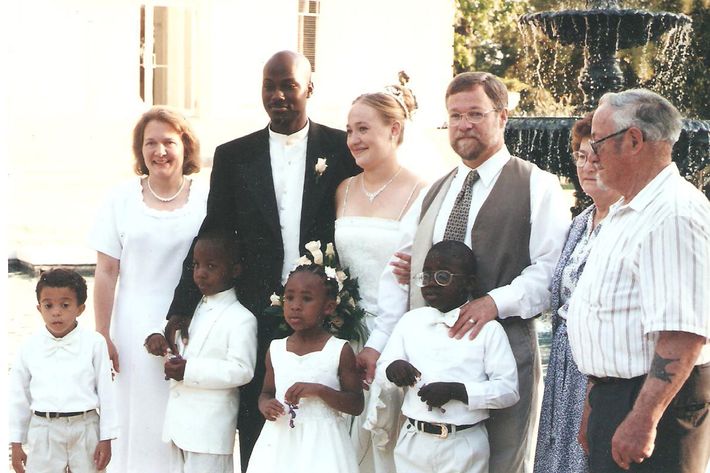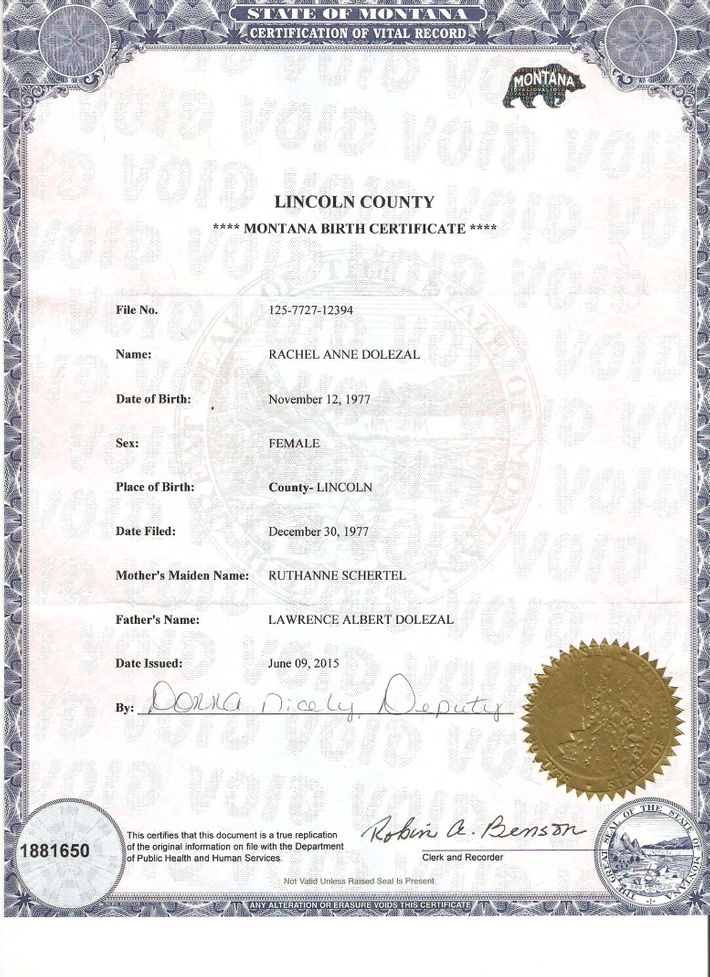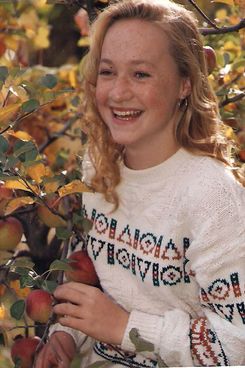
The bizarre story of how Rachel Dolezal went from being a blonde-haired, white Montana girl to the president of the Spokane branch of the NAACP, who most people assumed was black, has exploded in the past few days, kicking off a national debate on racial identity, “passing,” and even transgender issues. Rumors about Dolezal’s identity circulated for years, and last week her own parents, Larry and Ruthanne, exposed her, telling local media outlets that their family is of European descent and a small fraction Native American. They also accused her of lying about living in South Africa, being born in a tepee, having a stepfather, identifying a black man as her real father, and claiming one of her four adopted black siblings as her son, among other things.
This led to Dolezal’s resignation from her NAACP post, and on Tuesday the Africana studies professor attempted to explain herself in a series of interviews. She told Matt Lauer on Today, “I identify as black,” and insisted that’s how she’s viewed herself from an early age. But throughout the day, Dolezal’s account kept shifting. After mentioning that she’s been identified as “transracial,” she said in a subsequent interview that the term doesn’t apply. She acknowledged that Larry and Ruthanne raised her — though she considers Albert Wilkerson, who is black, to be her dad — then raised the possibility that they aren’t her biological parents. Here’s a guide to Rachel Dolezal, in her own words, or at least who she’s claimed to be over the years.
Dolezal on Her Racial Identity
“It’s a little more complex than me identifying as black or answering a question of ‘Are you black or white?’ I was actually identified when I was doing human-rights work in North Idaho as first transracial, and then when some of the opposition to the human-rights work I was doing came forward and started, the next newspaper article identified me as being a biracial woman, and then the next article when there were burglaries, nooses, etc., was ‘This is happening to a black woman.’ And I never corrected that … It’s more complex than being true or false in that particular instance.” [Today, June 16, 2015]
“I’ve never said like, ‘I’m transracial,’ but the hashtag ‘transracial lives matter,’ you know that’s like all lives matter, everybody’s life matters, but that’s why we have to say “black lives matter” [she describes the prejudice unique to black people]. To hashtag ‘transracial lives matter’ is kind of a diversion from [’black lives matter’], so that’s not what I’m about.” [MSBNC’s All In, June 16, 2015]
“Well, I definitely am not white. Nothing about being white describes who I am so, you know, what’s the word for it? The closest thing I can come to is, if you’re black or white, I’m black. I’m more black than I am white. So on a level of values, lived experience, currently, in this moment, that’s the answer. That’s the accurate answer from my truth. But I hope the dialogue continues to push against what is race, what is ethnicity.” [NBC Nightly News, June 16, 2015]
On whether she’ll go back to identifying as white: “I haven’t switched faces back and forth. I think that it can be read as I was socially conditioned to sanction this part of myself, I finally had the freedom to start owning this and celebrating and reconnecting — whether this is a spiritual sense, a cultural sense, race, ethnicity, etc. … Finally I was able to, about ten years ago, make personal choices about what I wear, what I look like, so from that point forward it’s been a continual process of evolution and growth.” [MSBNC’s All In, June 16, 2015]
On reading about Caitlyn Jenner’s Vanity Fair profile: “I cried, I cried. Because I resonated with some of the things — themes of isolation, of being misunderstood, especially in this very high-pressure, high-risk, low-trust, pressured, stressed, even borderline attacked experience in my life right now.” [NBC Nightly News, June 16, 2015]
Dolezal on Her Appearance
“I certainly don’t stay out of the sun. I also don’t, as some of the critics have said, put on blackface as a performance. I have a huge issue with blackface This is not some freak Birth of a Nation mockery blackface performance. This is on a very real connected level, how I’ve actually had to go there with the experience — not just a visible representation, but with the experience. The point at which that really solidified was when I got full custody of Izaiah and he said, ‘You’re my real mom.’ He’s in high school and for that to be something that is plausible, I certainly can’t be seen as white and be Izaiah’s mom.” [Today, June 16, 2015]
“I have experimented with my hair since living in Mississippi, really, and doing hair on the porch, you know braiding and that kind of was the beginning of hair transformation for me. When race boils down, it’s like hair, skin color, and eye shape — those are the three identifiers physically of race as a construct. So yeah, I definitely prefer to not, like, stay out of the sun … I don’t know necessarily if my skin color has changed. It depends on the season. I have not taken any of the melanin shot … Some days I may spray bronzer and get a little glow; some days I don’t. It depends on my morning prep routine and how much time I have.” [NBC Nightly News, June 16, 2015]
When asked about her hair: “If I’m at the grocery store or anywhere else, I’d be like, None of your business, back off. But yeah, so this is a weave and I do it myself … I do threads, I do braids. I’ve just been doing this because I haven’t had time recently to change for about a couple months. Usually when it hits summer I go back to my locks.” [NBC BLK, June 16, 2015]
“I don’t know if that was a conscious, I am going to now physically transform myself at this juncture. It was more like something that just happened as I had more choices, especially after my divorce, and was able to kind of just be me and explore myself and what I like and how I feel beautiful.” [NBC Nightly News, June 16, 2015]
“My hair journey has been interesting; certainly I’ve gotten the whole TSA, ‘But there’s so much of it, we have to search it.’” [MSBNC’s All In, June 16, 2015]

Dolezal on Her Family
In a February 2014 interview, Dolezal told The Easterner, Eastern Washington University’s student newspaper, about her experiences growing up in Montana, Colorado, and South Africa.
[In] Montana, we had my dad’s campaign signs graffitied with “nigger” and had to go around washing that off in the mornings when he was running for county commissioner.
In South Africa, the kids would beat up mixed kids for having darker siblings, but when my darker brother stepped in, they grabbed sticks and beat him, then threw rocks. We were home-schooled sometimes because of this and other social pressures. Although there is nothing that can be said to minimize the impact of racism in Mississippi, I was part of a vibrant community in West Jackson and the support of everyone working together toward community development was truly fantastic. I haven’t been part of a community like it since.
The only place I’ve ever lived where I felt like I could relax and just be myself was Washington, D.C., I am in love with the East Coast area, because it is much more international and you can find cultural company and kind of blend into the mix of people better than areas where there is either an absence of a strong black community or an extreme divide that sets up rifts equivalent to segregation. Probably one of the reasons I love D.C. the most, though, is because I was at Howard University. As a school that exists to promote Black values … it is definitely an oasis.
In February 2015, Dolezal shared her biography with The Easterner again:
From the Montana tepee where she was born in 1977 to empowering the black community in Spokane today, Dolezal has lived a life full of experiences “most people normally don’t have to go through.”
According to Dolezal, “Jesus Christ” is the witness on her birth certificate. Her mother believed in living off the land; they lived in the middle of nowhere.
As a child, Dolezal and her family hunted their food with bows and arrows.
From Montana, she, her mother, stepfather and three siblings moved to Colorado in 1992 for two years. From there, her family moved to Cape Town, South Africa, where her stepfather accepted a religious job opportunity.
“It’s a painful thing to talk about my childhood,” she paused as she looked down into her hands. “I kind of don’t talk about it much.”
She added that today she and her siblings have no contact with her mother or stepfather, who physically abused them:
“They would punish us by skin complexion,” she said. According to Dolezal, the object her mother and stepfather used to punish them was called a baboon whip, used to ward baboons away in South Africa. These whips would leave scars behind, “they were pretty similar to what was used as whips during slavery.”

“At 12, [my son] still distinguishes himself as the only black kid at his school actually being raised by a black parent.” [Dolezal’s Inlander column, April 28, 2014]
On her son Izaiah: “He used to be my brother .. But I have full custody of him now.” [CDA Press, June 11, 2015]
“We just … connected in a very intimate level as family … Albert Wilkerson is my dad. Any man can be a father, not any man can be a dad.” [Today, June 16, 2015]
“Up to this point, I haven’t had a DNA test; there’s been no biological proof that Larry and Ruthanne are my biological parents … I’m just saying, I can’t prove that [they’re my parents]. I’m not saying that I can prove they’re not, but I don’t know that I can actually prove they are. The birth certificate is issued a month and a half after I’m born and certainly there are no medical witnesses to my birth — it was in the woods.” [NBC Nightly News, June 16, 2015]
“If I’m talking about Mom and Dad, I don’t really have a mom figure in my life right now. I have a dad, and I’ve talked about him … I do acknowledge that the people who raised me are Larry and Ruthanne. I do not feel like they are my mom and dad … hopefully, even if I am judged or there’s confusion, anger about how I identify, I hope that people can understand that family is fluid.” [MSBNC’s All In, June 16, 2015]
Dolezal on Her Childhood
“This goes back to a very early age, with my self-identification with the black experience as a very young child … I would say [it started at] about 5 years old … I was drawing self-portraits with the brown crayon instead of the peach crayon, and the black curly hair … that was how I was portraying myself.” [Today, June 16, 2015]

When shown a photo of herself as a teen: “I would say that visibly she would be identified as white by people who see her.” [Today, June 16, 2015]
“I from a very young age felt a spiritual, visceral, just very instinctual connection with ‘black is beautiful,’ just the black experience and wanting to celebrate that, and I didn’t know how to articulate that as a young child. In kindergarten or whatever, you don’t have words for what’s going on, but certainly that was shut down. I was socially conditioned to not own that and to be limited to whatever biological identity was thrust upon me and narrated to me. And so I kind of felt pretty awkward a lot of times with that, and I remember when Larry and Ruthanne chose to adopt my younger siblings and knowing some of the resistance to my independent spirit and creative ways that I wanted to express myself, I felt like, Who is going to be the link for the kids in coming to the family? and I really felt like a mother-sister from the beginning.” [MSBNC’s All In, June 16, 2015]
“Some of it has been a little bit of creative nonfiction with regards to what happened and the sequence of events and dates and so forth. I’ve never seen pictures of Ruthanne being pregnant with me, and the birth certificate is a month and a half after I was actually born. And yes, they were living in a tepee and building the house when I was actually born and I actually remember, the tepee was across the road from the house, and yes, I had a recurve bow and Larry had a compound bow and there was hunting … in Montana … My family, meaning my three younger siblings and Izaiah, moved to Montana to Colorado to South Africa, and I went to undergrad school in Mississippi and then I went to grad school at Howard [University] — that’s all true. So ‘my family moved here and then did this’ doesn’t necessarily mean I went each place with them through that whole process.” [MSBNC’s All In, June 16, 2015]
Dolezal on Whether She’s a Liar
When asked, “Have you ever lied about your race?”: “No, because I’ve never been asked, ‘Are you human or not human?’ Race as a construct is a fluid understanding.” [NBC Nightly News, June 16, 2015]
“I felt very isolated with my identity virtually my entire life, that nobody really got it and that I didn’t really have the personal agency to express it. And certainly I kind of imagined that maybe at some point, especially after the kids were graduated from high school and in their adult stride, that maybe I’d be able to really process that, own it publicly and discuss this kind of complexity, but certainly I wasn’t expecting it to be thrust upon me right now.” [MSBNC’s All In, June 16, 2015]
“There have been moments of some level of creative nonfiction where in order to survive or protect people that I loved I have kind of had to explain or justify some of the timeline and logistics of my life in a way that made sense to others. I’ve tried to find words that have been able to connect to people that I’m talking to, understanding what their perceptions of the definition of race, culture, and ethnicity might be.” [NBC Nightly News, June 16, 2015]





























